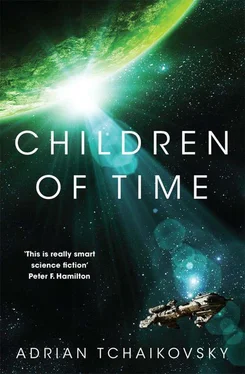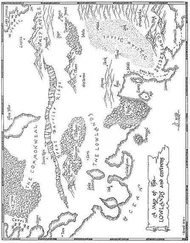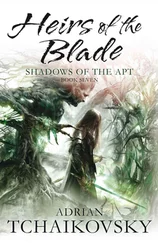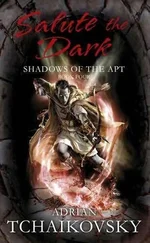‘Oh.’ Holsten stared at them. ‘You’re completely mad. It’s… there are monsters there.’
‘Monsters can be fought,’ Scoles declared implacably.
‘But it’s not just that – there’s a satellite. It came within a hair’s breadth of destroying the whole of the Gilgamesh . It sent us away. There’s no way a shuttle can… possibly get…’ He stammered to a halt, because Scoles was smiling at him.
‘We know all this. She told us,’ a companionable nod towards Lain. ‘She told us we’d never make the green planet. That the ancient tech would get us first. But that’s why we have you, Doctor Mason. Maybe Nessel’s grasp of the ancient languages would be enough, but I’ll not take that chance. Why should I, when you’re right here and desperate to help us?’ The chief mutineer stood up easily, still with that razor grin on his face.
Holsten looked at Lain, and this time she met his gaze and he read the emotion there at last: guilt. No wonder she’d been easy on him. She was cringing inside, knowing that she had brought him here.
‘You told them I could get them past Kern?’ he demanded.
‘No!’ she protested. ‘I told them it couldn’t be done. I said that, even with you, we barely made it. But I…’
‘But you managed to get them thinking of me,’ Holsten finished.
‘How was I to know these fuckwits would just—’ Lain started, before Scoles stamped on her ankle.
‘Just a reminder,’ he growled, ‘of who you are and why you deserve all you get. And don’t worry, if we have to take the shuttle, you’ll be right there with us, Chief Engineer Lain. Perhaps then you might feel like using your expertise to prolong your own life, for once, rather than just to ruin other people’s.’
The Great Nest. The greatest metropolis of Portia’s kind. Home.
Returning like this, at the head of a band of defeated stragglers – those lucky enough to escape the flames of Seven Trees – Portia feels something analogous to shame. She has not stopped the enemy, or even slowed it down. Each day, the ant colony will march closer to Great Nest. Looking across the expanse of her beloved birthplace, she finds herself picturing it in the throes of evacuation. In her mind’s eye – a faculty already present in some form even for her tiniest ancestress – she sees her home burning. The ants do not know where Great Nest is, of course – their spread across the world is methodical but mindless – but they will reach the coast soon. The days are counting down to when they will arrive at the gates.
Great Nest is vast, home to several thousand spiders. The natural forest is still thick here, but great effort and artifice has gone into erecting artificial trees to provide more living room. Great pillars made from felled trunks, sheathed and strengthened with silk, spread out from the living copse at the city’s centre – and even out into the sea itself, allowing the webwork of the city to reach out across the waters. Space is at a premium and, over the last century, Great Nest has grown exponentially in all directions, including up.
Beyond the city proper, there lies a patchwork of farms: aphids for honeydew, mice for meat, and stands of the blister-trunked trees cultivated by the ants, another secret stolen from the enemy. The seas throng with fish ready for the netting, and offshore there is a sister-settlement on the sea-bed; relations with the marine stomatopod culture are cordial and mutually profitable, in a minimal sort of way. A generation ago there was friction as the spiders began to expand their city seawards. The sunken bases of the pillars, however, have enriched the marine environment, providing an artificial reef that sealife has quickly taken advantage of. In retrospect, the sea-dwellers concede that they have gained from this situation, however inadvertently.
Portia and her band get aloft quickly, clambering up towards the city on lines strung over the outlying farmland. She has brought back some warriors, and a reasonable number of males, though few will thank her for returning with the latter. The smaller males are better able to parachute to safety: they survived when many of their sisters did not. And they fought, Portia concedes. The idea of a male warrior is absurd, but they are still stronger and faster and more intelligent than ants. For a moment she has a mad idea: arm and train the males, thus vastly increasing the number of fighters available to Great Nest. But she shies away from the idea instantly – that way anarchy lies, the reversal of the natural order of things. Moreover, even that way their numbers would not be enough. Arm every male in the city and the spiders would still be only a drop against the ant colony’s ocean.
She reaches a high vantage point, looking down at the great elegant sweep of her home, the myriad threads that link it all together, Down in the bay she sees a great balloon of silk half-submerged in the water, sagging and rippling as it is filled with air. An embassy to the stomatopods, she knows: a diving bell allowing inquiring minds amongst her people to visit their underwater counterparts. There can be no exchange of Understandings with the sea-dwellers, of course, but they can still teach and learn via the simple language of gestures that the two cultures have worked out between them.
Seek out your peers , she instructs her fellows, the returning warriors. Await the call. The males she leaves to their own devices. If they possess any initiative, they will find work and get fed. In a vast city like Great Nest there is a constant need for maintenance – lines and sheets of silk needing repairs. An industrious male can make himself useful enough to be rewarded. The alternative for him is to make a living through courtship and flattery, which involves less effort but considerably more danger.
Portia sets off through the city, creeping and jumping from line to line, seeking out her peer house.
Using communal crèches and lacking any maternal instincts, Portia’s people have no strict family units. The youngest spiderlings, still confined to the crèche, are provided with food by the city, but this period of free bounty does not last long. The fast-maturing young are expected to become independent within their first year. Like the males, they must make themselves useful.
Because a spider alone is vulnerable, always at the mercy of bullying from her larger kin, these maturing spiderlings tend to band together into peer groups formed from those who hatched from the same crèche at around the same time. The bonds made between juveniles, who aid and rely upon one another, persist into adulthood. Unions of such peers form the base social unit in most spider settlements, and these peers then tend to found a crèche between them, looking after one another’s eggs, and so inadvertently perpetuating a continuity of heredity down the female line. The social bonds within such peer groups are strong, even after the individuals have gone their separate ways and taken up their particular trades and specialities. All the larger peer groups maintain peer houses within the city – ‘house’ here meaning a complex of silk-walled chambers.
Males do not form such groups – for who would have any use for a large group of males? Instead, juvenile males do their best to attach themselves to the periphery of a female peer group, playing at flirting, running errands, paying in utility and amusement value for the scraps of food that might get thrown their way. Portia is vaguely aware that males fight each other, and that the lower – less desirable – reaches of the city play host to countless little dramas between males struggling over food or status. She has very little interest in the subject.
Читать дальше












